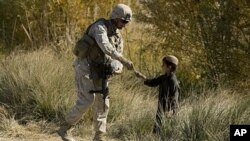U.S. President Barack Obama has invested heavily in both Pakistan and Afghanistan during his first full year in office. In 2009, the Pakistani government accepted a U.S. pledge of $1.5 billion annually for five years. Meanwhile in Afghanistan, President Obama tripled the number of American civilians at the U.S. Embassy to nearly 1,000 in order to better help with the country's reconstruction. But despite the civilian efforts, President Obama's main focus remains on fighting terrorism in the region.
Minutes after taking the oath of office, President Obama made a promise to the American people and the rest of the world.
"We will begin to responsibly leave Iraq to its people, and forge a hard-earned peace in Afghanistan," he said.
But before that peace could be achieved, the U.S.-led coalition had to tackle a strong Taliban presence in Afghanistan's southern provinces.
The coalition increased air strikes on suspected militant positions. But the new strategy caused a public backlash in the country as reports of civilian casualties rose.
In late March, President Obama announced a new focus on Afghanistan.
"For three years, our commanders have been clear about the resources they need for training. Those resources have been denied because of the war in Iraq," he said. "Now, that will change."
Mr. Obama ordered thousands of more U.S. troops to the country. Later on, he also changed the top military leadership there to U.S. General Stanley McChrystal with the explicit order to minimize civilian casualties.
As the United States intensified the fight against the Taliban in Afghanistan, the Pakistani government tried to pursue a peace plan with militants on its side of the border.
But the Taliban broke the terms of the deal and advanced in the Swat Valley region to within 60 kilometers of the capital, Islamabad. Taliban fighters conducted public beatings and also closed down some girls' schools.
The Pakistani military responded, and about 2.5 million people fled the area.
By mid-2009, the U.S. Special Envoy to the region, Richard Holbrooke, commended the Pakistani military for making significant gains against the Taliban in the country's northwest.
"We have said it before and let me say it again: Afghanistan cannot be stabilized unless Pakistan does its part in its western regions. And right now, finally, the Pakistani army is engaged in a very significant military offensive against the Taliban, Holbrooke said."
President Obama then began pressing Islamabad to expand its operations to the Waziristan tribal areas and tackle militants with explicit ties to Afghanistan.
After a series of militant attacks shocked the country in October, Pakistani army spokesman Major General Athar Abbas announced the launching of operations in South Waziristan against Taliban believed to operate exclusively in Pakistan.
"Any kind of instability in this region, or in this area, would radiate or affect instability in the other area," he said.
But President Obama's military chief, General Mike Mullen, tells VOA that Pakistan still needs to expand its operations. He says Pakistan also needs to target Taliban who are believed to have fled Afghanistan to operate in sanctuaries in the North Waziristan tribal region.
"It is those Taliban that are killing Americans. It is those Taliban that are killing Afghans," Mullen said. "It is those Taliban that are killing coalition forces from our allies, so it is going to take pressure on all extremist groups."
In late December, the Obama administration faced the possibility the Pakistani Taliban was mirroring its Afghan counterpart by launching attacks against coalition forces in Afghanistan.
A suicide bomber killed seven U.S. intelligence agents in Afghanistan, allegedly to avenge the death of Pakistani Taliban leader Baitullah Mehsud, who was killed earlier in a suspected U.S. missile strike in Pakistan. Both the Afghan and Pakistani Taliban claimed responsibility for the suicide bombing.
President Obama has started sending 30,000 more troops to Afghanistan. He says he hopes to successfully counter the increasing insurgency and ultimately transfer security responsibilities to Afghan forces.
But in order for that to happen, Mr. Obama has promised to strengthen the U.S. partnership with both Afghanistan and Pakistan.
Obama Shifts US Focus from Iraq to Afghanistan Early in Presidency













